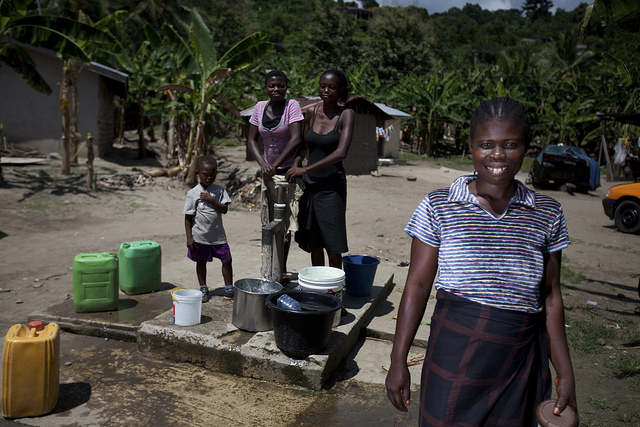The growth of inequality is a major threat to prosperity and stability. Government leadership and government investment is needed to provide water and sanitation services to the poor.
Published on: 22/01/2015

This week, the world's powerful and wealthy meet at the Davos economic summit. In the run-up Oxfam has published its latest inequality report [1],which states that by next year 1% of the world's population will own more than 50% of the World's wealth and that only 80 individuals in the World have the same wealth as 3.5 billion people (the poorest 50%).
It was the 90s, when I was in Helsinki on a university exchange programme with the Swedish School of Management when I first heard: "I get it that you worry about poverty, your country (Portugal) is poor, but why do you care about inequality? Are you envious?" I remember I could only mutter a "No, I'm not envious, it's just ... not fair". I always thought my answer at the time sounded childish, for lack of a better argument.
More equal societies do better at pretty much everything
Since the 90s inequality worldwide has increased dramatically, as well as studies on the subject. Branko Milanovic published a paper [2] in 2007 challenging the then common assumption of many economists: that inequality was irrelevant, that as long as everyone's wealth increases, we should not worry that it's being distributed unequally. Milanovic argues that even if everyone has more, inequality creates a sense of injustice – because people inevitably compare themselves with their peers and wealth (and income) are a tangible recognition of how society values them. This argument has been elaborated since by authors like Richard Wilkinson and Kate Pickett's whose "Spirit level" book [3] argued that more equal societies do better at pretty much everything; and of course by today's rock-star economist Thomas Picketty whose Capital in the 21st Century points to the growth of inequality as a major threat to global prosperity and stability.
Following this line of thinking, Oxfam argue that rising inequality levels are bad for overall growth and for governance. Making the point that wealth gained tends to be used by the rich to lobby for their own interests in key economic sectors and to dodge paying taxes "the most prolific lobbying activities in the US are on budget and tax issues".
In the face of this, Oxfam calls on governments to adopt a seven point plan that includes among others the need to: close international tax loopholes; introduce minimum wages and safety nets for the poorest; share the tax burden fairly; and, crucially to achieve universal free public services by 2020. Oxfam specifically mention the need for taxes being used for health and education (with which I fully concur) and I'm sure they'd also agree with the addition of another crucial service to their list: safe drinking water supply and sanitation services.
Governments need to get more serious about their responsibilities
Since the adoption of the right to water and sanitation as fundamental human rights, many in and beyond the sector have struggled to square this with the need to pay for their universal provision, made more difficult by decades of neo-liberal insistence on the need to look to the private sector and private finance. IRC isn't against the involvement of the private sector (and finance) in the provision of water and sanitation services – they have an important role to play worldwide in the creation of businesses and support to innovation. But we need to be clear about who is responsible and accountable for service provision – and that is national government. And we are equally clear that the provision of these services – especially to the poorest – will require government money. Governments need to get more serious about their responsibilities and we all need to get smarter at channelling finance, and particularly public money and taxes. As discussed during IRC's last event on public finance, domestic resource mobilisation will be a hot topic for the next 10 years.
I don't want to live in a world, surrounded by illiterate, sick people, with no safe water or sanitation. And I know that the only way to provide water and sanitation services to the poor is through government leadership and government investment. This is a necessary condition that even the most well intended business supporters will need to acknowledge – the much needed "enabling environment" to scale successful businesses is ... government. That's what IRC believes in and works towards – globally and especially with our government partners in our focus countries. And that's why IRC wholeheartedly supports Oxfam's report and its call for action.
Notes
[1] Hardoon, D., 2015. Wealth : having it all and wanting more. Oxford, UK: Oxfam GB. Available at: http://oxf.am/ZiUw
[2] Milanovic, B., 2007. Why we all care about inequality (but some of us are loathe to admit it). Challenge, 50(6), pp.109-120. DOI:10.2753/0577-5132500605
[3] Wikipedia: The Spirit Level: Why More Equal Societies Almost Always Do Better
At IRC we have strong opinions and we value honest and frank discussion, so you won't be surprised to hear that not all the opinions on this site represent our official policy.